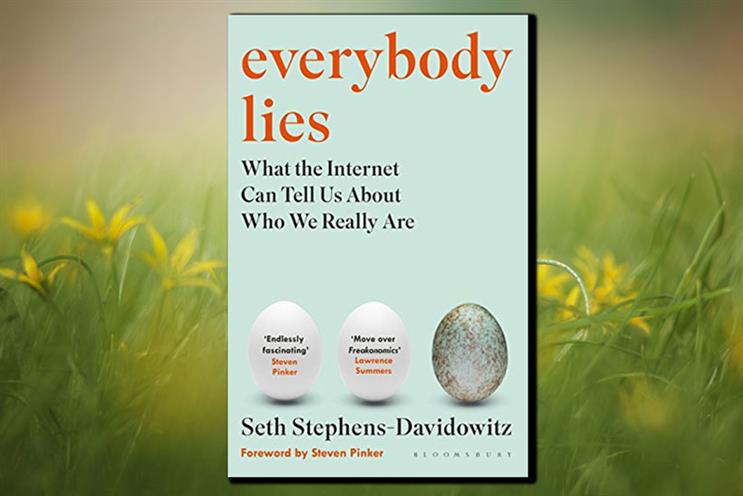8/10
Reviewed by Tom Laranjo, managing director, Total Media
Everybody Lies by Seth Stephens- Davidowitz
Published by Bloomsbury Publishing
In Everybody Lies by Seth Stephens-Davidowitz, the author delves into the depths of our psyches as exposed by our Google searches, to provide a fuller, more disturbing - and ultimately more accurate - picture of what people really think.
It would be an entertaining and enlightening read for anyone, but I would argue that for those in the business of persuasion – i.e. the entire advertising industry - it's a must read.
Stephens-Davidowitz contends that the power of Google search data is that people will happily tell the Google search bar truths about themselves that they wouldn’t tell their nearest and dearest.
However Google is not the only entry point into understanding human truths. Stephens-Davidowitz also examines the data gleaned from Wikipedia, Facebook, Twitter, white supremacist site Stormfront, Pornhub and other sources of big data, both online and offline, with varying degrees of success.
As part of his adventures in big data, Stephens-Davidowitz has a word of warning which the advertising industry would do well to heed: big isn’t necessarily best - it's what you do with it (advice the men featured in chapter four, worrying about their penis size, would also do well to heed). Specifically, that to get the most out of big data you need to ask the right questions, which may not be those that you would ask in traditional surveys. To master big data Stephens-Davidowitz contends that "data science takes a natural and intuitive human process—spotting patterns and making sense of them—and injects it with steroids, potentially showing us that the world works in a completely different way from how we thought it did".
Stephens-Davidowitz proves the impact of advertising by comparing the effect of a film ad shown during the Superbowl in areas where more or less people are watching the game
The title of the book comes to life in chapter four, where Stephens-Davidowitz discusses "social desirability" bias - the need to appear good - even in anonymous surveys. This is one of the reasons why marketers should be sceptical of self-reported data - whether that be surveys, or as Stephens-Davidowitz goes on to explain, Facebook, which is the ultimate arena where "everybody lies". One such example is lying about sexuality in a state or country that is less accepting, which Stephens-Davidowitz proves by comparing out and proud gay men on Facebook and corresponding Google and Pornhub searches for gay porn in the same areas.
What may be the most interesting element of the book comes in the sixth chapter, where Stephens-Davidowitz proves the impact of advertising by comparing the effect of a film ad shown during the Superbowl in areas where more or less people are watching the game. In the area where more people were watching the game and the ads, there was a resultant and proportionate increase in ticket sales. So if for no other reason, surely that’s cause enough to read.
Six takeaways
- Marketing can change the world. Kodak got people to smile in photos as they wanted people to take regular photos, instead of one-off portraits, so their advertising began linking photographs with sharing happy moments. This goes a long way to explaining the visual world we live in today.
- Understanding human nature can lead to business success. Facebook’s success is built on understanding human nature. At the time of the introduction, users complained the newsfeed was creepy. However Mark Zuckerberg knew that people’s curiosity would lead to further growth.
- Big data enabled A/B testing. This went a long way into making internet platforms addictive, as it became possible to carry out truly randomised experiments in a short time frame.
- The Filter Bubble is being pierced. Stephens-Davidowitz argues that liberals and conservatives are more likely to meet online than in real life.
- Men care about the size of their penis more than women do. In fact, women’s main concern is about the size being too large.
- Racism is alive and well in the US. Especially in the eastern states. This "Racism map" is the truest indicator of the areas where Trump won in 2016 and where Barack Obama struggled in 2008 and 2012.


